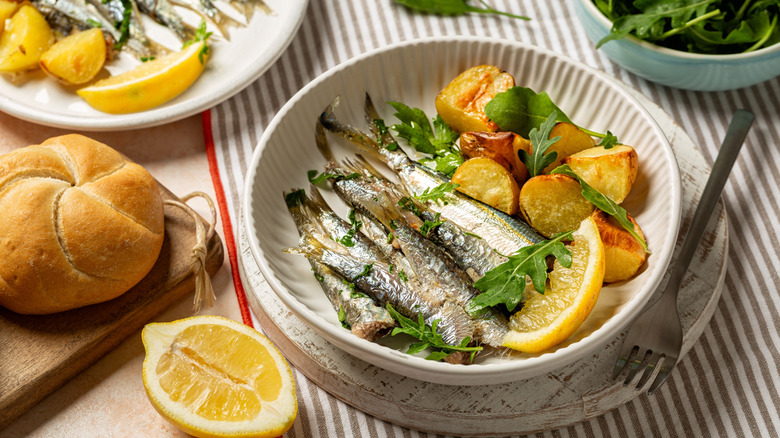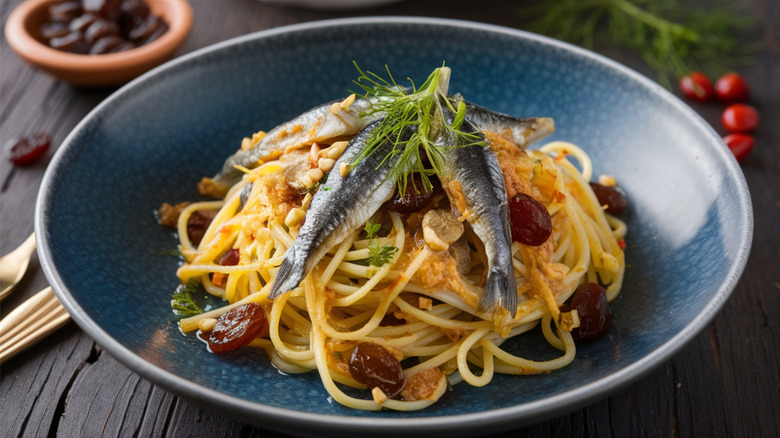An Unpopular Protein Is The Best Snack You Can Eat For Your Brain
We may receive a commission on purchases made from links.
As you read this, your brain decodes the various shapes of letters to form words. To understand what you read, your brain quickly retrieves information from your memory and matches it with the current words. Your brain is also receiving signals from your nerves and heart so your body continues to function. Maybe your ears or peripheral vision remain alert to any potential threat or object of interest. Your brain is critical for life.
You can keep your brain healthy by getting enough sleep, exercising, socializing, and stimulating your brain through puzzles and reading. Your diet also plays a huge role in your brain health, particularly by consuming more foods with omega-3 fatty acids. One snack rich in omega-3s is sardines.
"Sardines are a standout source of omega-3s, the type of fat preferred by the brain where they're essential to healthy brain function–from cognition to emotional health," said Maggie Moon, a Los Angeles-based registered dietitian and author of a new book, "The MIND Diet: 2nd Edition." Moon told Health Digest that omega-3s clear the communication channels in your brain. A 3-ounce serving of canned sardines has 837 milligrams of omega-3 fatty acids to support your brain health, and its 21 grams of protein help your brain make neurotransmitters.
Sardines can slow brain aging
Your mental function may change as you get older because some parts of your brain shrink. Integral communication pathways in your brain can also become less efficient as blood flow decreases and inflammation increases. Omega-3 fatty acids in sardines and other types of seafood can help reduce inflammation in your brain. "They encourage brain cells to make anti-inflammatory compounds so they can get to work on clean-up and repair from daily wear and tear, pollution, illness, or other stressors," said Moon.
She further explained that the 325 milligrams of calcium in sardines signal your brain's neurons to release neurotransmitters, and the iron helps to supply oxygen to your brain. "Eating seafood like sardines at least once a week is recommended by the MIND dietary pattern," said Moon, "which research suggests slows brain aging by up to 7.5 years and may cut the risk of Alzheimer's by up to 53%."
The MIND diet, which is a fusion of the Mediterranean diet and the DASH diet, emphasizes certain foods that promote brain health such as berries, nuts, and fish. According to a 2015 study found in Alzheimer's and Dementia, including more foods from the MIND diet can significantly slow cognitive decline. Those who followed the MIND diet more closely had a rate of cognitive decline similar to someone 7.5 years younger.
How to include brain-healthy sardines in your diet
If the thought of eating sardines makes you gag, Moon suggests trying sardines by themselves before adding them to some of your current recipes. "I always try new foods on their own before combining them in mixed dishes, even if it's a small taste," she said. "I'd encourage people to try sardines on their own so they understand it as an ingredient. OK, maybe not if you are 100% certain you won't like anything that tastes of the ocean. Otherwise, take a small taste and get to know your food."
If you've never eaten sardines, Moon says they're a mix between tuna and anchovies in terms of fishiness and texture. If the fishy taste turns you off, be sure to drain and rinse the sardines first before adding them to a dish. Acidic foods like tomato sauce, lemon juice, and vinegar can mellow the fish flavor. The bones in sardines are edible and boost the calcium content.
She suggests adding some sardines to a fish or crabcake recipe. Or, rather than make a tuna salad, you can mix sardines into some plain Greek yogurt and add a tuna salad spice mix. Sardines can also be pan-fried and tossed into pasta with some lemon and olive oil. Pan-fried sardines also make a great base for fish tacos.


